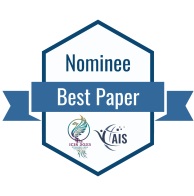Loading...
Paper Number
2415
Paper Type
short
Description
This paper reframes our understanding of the discourse on work-life balance (WLB) from a global perspective, where life on the four income levels (from bottom of the wealth to top of the wealth) is equally considered. Based on a systematic literature review, our initial insights are that WLB of workers in the highest economic sectors has received significant attention from scholars and practitioners in the west, while the global rest and those in other economic sectors, which represents the majority of the world’s population, has almost entirely been overlooked. We argue for a new understanding of WLB that addresses the needs of all people across the globe, regardless of their economic status or geographic position, and independent of their formal or informal work contexts. In our future work, we aim to address how disparities in: (1) agency and dependence; (2) privacy and exposure; (3) connection and disconnection; and (4) formality and informality can affect people's dignity, equality, and healthy environments.
Recommended Citation
Kajtazi, Miranda; Johnson, Desmond; Sarker, Saonee; Faith, Becky; and Venkatesh, Viswanath, "Reframing the Discourse on Work-Life Balance in the Digital Age" (2023). ICIS 2023 Proceedings. 5.
https://aisel.aisnet.org/icis2023/techandfow/techandfow/5
Reframing the Discourse on Work-Life Balance in the Digital Age
This paper reframes our understanding of the discourse on work-life balance (WLB) from a global perspective, where life on the four income levels (from bottom of the wealth to top of the wealth) is equally considered. Based on a systematic literature review, our initial insights are that WLB of workers in the highest economic sectors has received significant attention from scholars and practitioners in the west, while the global rest and those in other economic sectors, which represents the majority of the world’s population, has almost entirely been overlooked. We argue for a new understanding of WLB that addresses the needs of all people across the globe, regardless of their economic status or geographic position, and independent of their formal or informal work contexts. In our future work, we aim to address how disparities in: (1) agency and dependence; (2) privacy and exposure; (3) connection and disconnection; and (4) formality and informality can affect people's dignity, equality, and healthy environments.
When commenting on articles, please be friendly, welcoming, respectful and abide by the AIS eLibrary Discussion Thread Code of Conduct posted here.




Comments
04-Work